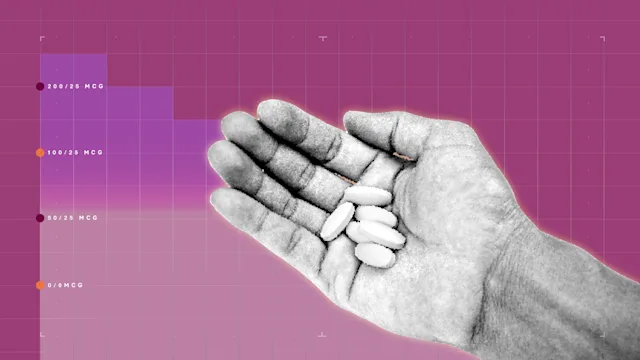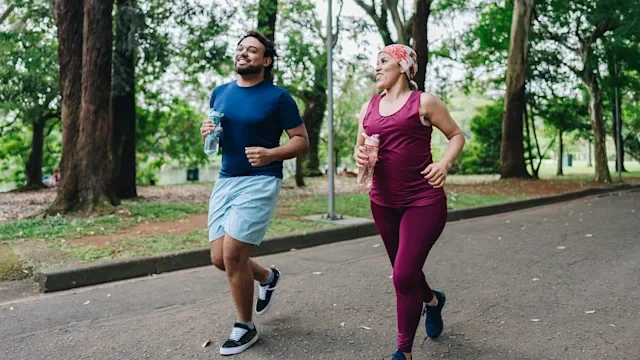Key takeaways:
Jenifer Obrigewitch was diagnosed with postural orthostatic tachycardia syndrome (POTS) her freshman year of college.
POTS makes your heart beat faster than normal when you stand up.
Jen tries to educate people about her chronic condition to give them a better idea of what she lives with.
Of all the places she could have fainted for the first time, Jenifer Obrigewitch found herself on a high school football field in the middle of band camp.
When she picked up her flute and got up, she knew something felt off but couldn’t figure out what. She wasn’t dehydrated and she hadn’t skipped breakfast.
The fainting spell turned out to be her first symptom of postural orthostatic tachycardia syndrome (POTS), a condition that affects your body’s ability to adapt to changes in position, like sitting, standing and lying down.
After the episode, Jen and her mother consulted with established doctors. Jen tried to get good sleep and eat nutritiously. And after 3 years, she finally got an official diagnosis.
Now, almost 7 years later, Jen has a much better grasp on her condition than when she first got diagnosed. It’s sometimes known as an invisible illness because it’s a chronic condition people can’t see. And many people are unfamiliar with it. While it affects up to 3 million Americans a year, it did not become known as a medical syndrome until the early 1990s.
Jen wants more people to understand what it’s like to live with this little-known condition. “When I first got POTS, I was the first person I knew with it,” says Jen, who’s 27 now and lives just outside of Boston. “Nobody was talking about it.”
Here are eight things that Jen wishes people understood about POTS.
1. POTS can be easily misdiagnosed
When Jen went looking for a diagnosis, one doctor said her issue might be low blood volume, because she was a frequent blood donor. Others suggested premenstrual syndrome (PMS).
With every dead end, Jen began to narrow down the possibilities. When her doctor suggested her dizziness and brain fog might be related to PMS, Jen got an IUD (intrauterine device) to regulate her hormones. That helped clarify which symptoms were related to PMS and which ones were from POTS, she says.
Read more like this
Explore these related articles, suggested for readers like you.
“It made it so much more mild and also easier to figure out what was going on,” she says.
2. Untreated POTS can put your life on pause
Fainting was only the first of many escalating symptoms for Jen. Sometimes, her heart rate would skyrocket to concerning levels.
“I would take showers, and my heart rate would go up to 200 beats per minute,” she says. “Sometimes, it would go up to 200 if I was eating. My mom was convinced it was from yogurt.”
Jen graduated from high school and moved on to college. During her freshman year at Northeastern University, her symptoms started to get more extreme.
“I started sleeping like 20 hours a day,” she says. “I would sleep through all my classes. I couldn’t get up for them. I didn’t have energy to do homework. My brain was super foggy. I was even eating apples because those are supposed to help you stay awake. From the moment I got up, I was drinking as much tea as possible. I did everything to stay awake, and I would immediately fall asleep after eating breakfast.”
She knew she needed help.
“There was a point when one of my friends actually had to carry me from the dining hall back to my room because I was so dizzy,” Jen says.
Jen went to see the university health director, who referred her to a cardiologist. The cardiologist then diagnosed her with POTS, at which point she was able to begin learning how to manage her condition.
3. Looking healthy does not always mean feeling healthy
Symptoms of POTS do not impact a person’s appearance. But the way Jen looked didn’t reflect how she was feeling.


“I look relatively healthy,” she says. “I don’t look like I have a major heart problem. I don’t look like it takes three times more energy for me to stand than the average person. And even my friends who understand and know I have it don’t realize how it impacts each and every day of my life.”
4. It takes more than medication to treat POTS
Jen takes medication to keep her blood pressure low, but that is only one part of her treatment.
She wears compression socks or leggings to help regulate her circulation. She’s found that eating small meals throughout the day makes her feel better than eating large meals. And she takes 5 grams of salt a day and drinks plenty of water, because her doctor told her people with POTS need extra sodium and fluid intake to increase blood volume and blood pressure.
5. You have to trust your ability to read your own body
Before her diagnosis, Jen got a lot of advice from people who suggested she just needed to get more water or sleep. But Jen knew there was something else going on, and she kept pushing to figure out what it was.
“I learned to trust my instincts on how I feel. I go at my own pace and advocate for what I need, because I am different,” she says, “You have to make a difference in your own prognosis.”
6. There can be an external pressure to feel better
A support system is important, but sometimes encouragement can start to feel like pressure, Jen says. She wants people to know that living with a chronic condition is a lifelong experience. It isn’t just another obstacle to conquer.
“The excitement that people have on my positive days can turn toxic when it starts turning into pressure to pretend to feel good — or to pretend that I’m out of a flare,” she says. “Everybody wants me to feel better. They really push for it, and I feel a lot of pressure to say I’m always feeling better.”
“Yes, there’s always improvement. But I’m always going to have POTS,” she adds.
7. It is important to find strategies that work for you
Jen has a busy life, and POTS can make keeping track of daily tasks harder. Between brain fog and general tiredness, it is essential for her to keep her life organized.
“I bullet journal. I use it for writing down to-do lists for my work and personal life,” she says. “Brain fog makes me forget a lot of things. I wouldn’t be where I’m in my career if I didn’t write things down and figure out a system that works for me. It’s become a cornerstone of how I survive my week, because without it I’m too busy to figure these things out.”
8. POTS doesn’t care about your schedule
Jen has a much better handle on her POTS now that she has been working with her doctor to manage it. But she has good days and bad days.
“Just because I feel good today, and I want to go on that hike, it doesn’t mean I’m gonna go as fast as everyone else,” she says. “Sometimes, I can take the stairs at work. But I can’t do that all the time. And just because you saw me do it yesterday, doesn’t mean I can do it today.”
So she takes things day by day.
“Even if I do all of my medications and all of my little tricks to feel good, I can’t predict how I’m going to feel. And it’s going to change from day to day and sometimes hour to hour,” she says. “As much as I know my body, I also can’t predict everything.”

Why trust our experts?




















